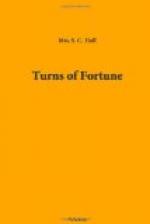I have dwelt longer than was perhaps necessary on the minutiae of this relation, the principal events of which are so strongly impressed upon my memory. But the more I have thought over the story, the more I have been struck with the phases and impulses of Sarah Bond’s unobtrusive, but deep feeling mind; her self-sacrificing spirit, her devotion to her father’s will, her dread, when first in possession of the property, that any one act of liberality on her part might be considered a reproach to his memory; her habits struggling with her feelings, leading me to the conclusion that she would never have become, even with the expanding love of her niece to enlarge her views, thoroughly unmanacled from the parsimonious habits of her father, but for her lesson in adversity, which, instead of teaching as it does a worldly mind, the value of money, taught her higher nature its proper uses.
It was beautiful to see how Mabel grew into her aunt’s virtues; and even Mr. Goulding was startled by the energy and thoughtfulness of her character. She soon convinced Mr. Lycight that her prospects grew brighter in his love; and for a time he was romantic enough to wish she had continued, penniless, and he had been born a peer, to prove his disinterested affection. This, however, wore away, as man’s romance always does, and he absolutely became reconciled to his bride’s riches. Sarah Bond was living a very few years ago, beloved and honoured, the fountain of prosperity and blessing to all who needed. There was no useless expenditure, no show, no extravagance in “the establishment” at the old manor house; but it was pleasant to perceive the prosperity of the poor in the immediate neighbourhood; there was evidence of good heads and kind hearts, superintending all moral and intellectual improvements; there were flourishing schools, and benevolent societies, and the constant exercise of individual charities; and many said that Sarah Bond, and niece, and nephew, did more good with hundreds than others did with thousands. From having had practical experience of poverty, they understood how to remedy its wants, and minister to its sorrows. And to the last hour of her prolonged life, Sarah Bond remembered
THE USES OF ADVERSITY.
* * * * *
ALL IS NOT GOLD THAT GLITTERS.
CHAPTER I.
“There they go!” exclaimed old Mrs. Myles, looking after two exceedingly beautiful children, as they passed hand in hand down the street of the small town of Abbeyweld, to the only school, that had “Seminary for Young Ladies,” written in large hand, on a proportionably large card, and placed against the bow window of an ivied cottage. “There they go!” she repeated; “and though I’m their grandmother, I may say a sweeter pair of children than Helen Marsh and Rose Dillon never trod the main street of Abbeyweld—God bless them!” She added earnestly, “God Almighty bless them!”




